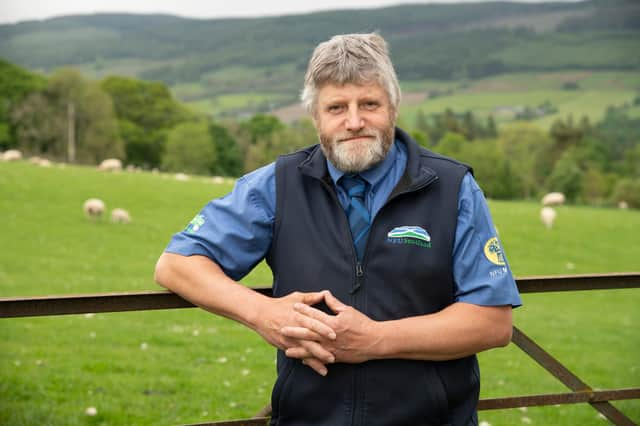Farming chief Kennedy warns of dangers over land management scheme


Speaking at NFU Scotland’s on-line annual general meeting the union’s president Martin Kennedy said while these three key factors were driving future government strategy, it was imperative they were given equal weighting in the decision-making process.
Focusing purely on climate measures, said Kennedy, would result in a severe threat to the nation’s ability to feed itself if critical mass was lost and cheap imports flooded into replace high standard, home-produced foods.
Advertisement
Hide AdAdvertisement
Hide AdWarning that if farmers found the only way forward was to produce less, he said the industry, those that relied on it and ultimately the economy would implode.
“At every opportunity what we must do is highlight the true value of domestic food and drink production in terms of health, climate change, the environment and the economy,” he said.
And he added that policy makers needed to deliver meaningful support for the industry.
He expressed fears that the policy “car-crash” unfolding south of the Border through the deeply unpopular Environmental Land Management Scheme (ELMS) could have negative consequences for Scotland’s agriculture. He claimed economic analysis had shown it would not work for producers and said the approach should have been shelved a long time ago.
“With few producers in England showing any enthusiasm for taking this cornerstone scheme up, there is a real risk that the powers-that-be will say that farmers were offered support but didn’t want to take it up - and then use this as an excuse to cut the budget for farming across the board.”
Turning to his own involvement as co-chair of Scotland’s body for overseeing the introduction of new policy, the Agriculture Reform Implementation Oversight Board (ARIOB), Kennedy admitted such a decision had not been taken lightly by the union – and that he had taken a chance “putting his head on the block”.
He said that if the opportunity to become so closely involved with policy development hadn’t been grasped by the farming sector, other interests would have certainly done so – and if an unfavourable outcome was presented down the line then criticism for missing such an opportunity would have been valid.
But he made it clear that despite his personal involvement with the group, the union wouldn’t hold back from criticising aspects in the final policy with which it was unhappy.
Advertisement
Hide AdAdvertisement
Hide AdKennedy also warned that the union and the industry as a whole was currently facing unprecedented challenges, including soaring inflation on input prices and labour shortages as well as policy development.
“Sadly, these are just the headline issues we are facing, there are countless other ongoing concerns from issues with slurry storage, land reform, crime, species management, right through to problems with utility companies, access rights, plastics, carbon credits and forestry,” he said.
Comments
Want to join the conversation? Please or to comment on this article.